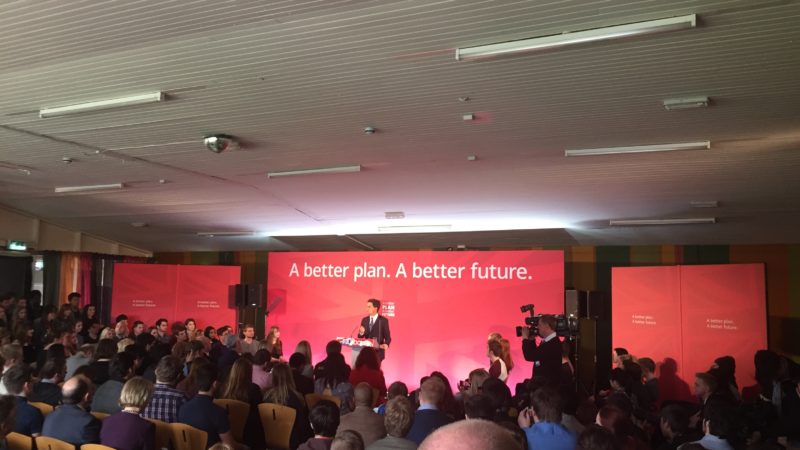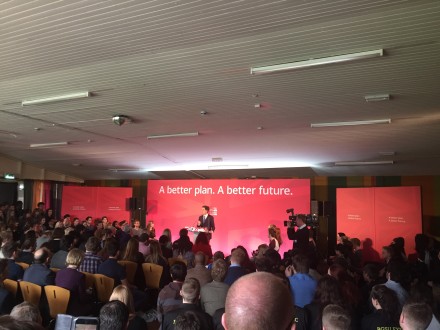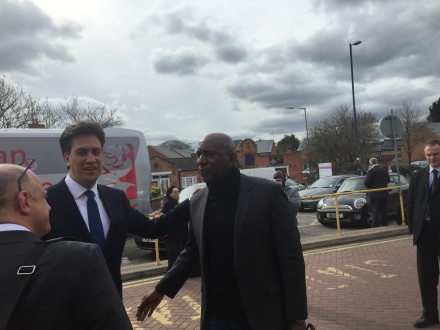
Ed Miliband arrived in Lincoln on Friday in good spirits – and justifiably so. Only the previous evening he had won the final TV debate. After Cameron (and Clegg) failed to take part, Miliband was the sole potential Prime Minister on display, and despite facing three (co-ordinated) party leaders attacking him from the left and one from the far right (of the stage and the political spectrum) he came out on top.
There was a palpable sense of relief in the wider party that the Labour leader had passed perhaps the sternest test of his leadership so far – and Miliband’s demeanour suggested he felt likewise. Striding into the hall at Bishop Grosseteste University to the snap and pop of camera flashes and the cheers of hundreds of young voters, Miliband exuded confidence.
His speech was well delivered, but – as has often been the case – it was during the Q&A session where he came into his own. Leaning jauntily on the podium he took dozens of questions from media and audience alike. Sure, the media questions were all practically identical and had nothing to do with the event or the announcement he was making on unpaid internships. But he handled them calmly and thoroughly. He was engaging, and he was funny – people seldom say about Ed Miliband but it’s true.

Afterwards I was able to clamber aboard Miliband’s battle bus to speak to him about the campaign so far. Actually – and of course I should have worked this out sooner – there are two battle buses. They look identical from the outside, but there are subtle difference (one has a toilet) and the denizens of the buses appear to prefer one or the other. The one I see the inside of (the toiletless one) is plushly decked out without being flash. There are tables for getting work done, and there’s the powerful odour of new car (bus?) smell.
As the bus rolls onto its next stop, Miliband sits down opposite me, a big beaming grin on his face. By this point it’s Friday afternoon – the end of another long election week. And I’m feeling pretty exhausted just writing about it, so I can only imagine what it’s like to be at the centre of the maelstrom. He says that it’s “exhausting” and “has its tense moments”, but on the whole he seems happy:
“I’m enjoying it. It’s sort of why I joined the Labour Party – to campaign for a vision of a better society – and I never thought I’d be doing it as leader, but that is a huge huge privilege.”
And what about the campaign itself?
“I think our campaign has had energy. I think it has had interest. I think we’ve made the weather – on non-doms, on zero-hours contracts on housing, in our manifesto launch. I think it’s the opportunity to tell people where I stand and what I stand for – and I relish that chance.”
This is something that Miliband comes back to over and over during our conversation – the opportunity to make his case, tell people what he stands for and get a hearing for what he actually believes. That’s understandable. For years the British people have, by and large, been given a simple and unflattering caricature of Miliband and been told this was all there was too him. Bacon sandwiches, teeth and a bruising battle with his elder brother. He’s clearly enjoying the chance to prove he’s much more than that:
“You can’t say fairer than wanting to put your case forward. If you put your case forward then the people get to make the decision. All I’ve ever wanted is the chance to make my case – because I’ve always thought if I make my case people are more likely to vote for us. The more of it the better.”
And he’ll have more chances in the final couple of weeks of the campaign. He still has to face Evan Davis on Newsnight, he still has to be grilled on the Today Programme – and he’s still got to face the Question Time audience a week before election day. But whilst many assumed Miliband would wilt under the media spotlight, he has grown. To those of us who have watched him at close quarters it’s no surprise that the predictions of the right wing press about his performances have proved so inaccurate – but quite how much he has confounded expectations remains a pleasant surprise.
It’s nearly five years since I first interviewed Ed Miliband. Back then the venue was the somewhat sterile central London office where his leadership campaign was based. He was not the favourite for that contest, but he had momentum. He was surprising people by how capable and personable he was. And yet when I asked him if he’d started thinking about life as Labour leader, he said he wasn’t “measuring the curtains”. That phrase returns again when I ask if he’s envisaged himself walking through that famous black door on his first day as Prime Minister. I find that surprising. I bet most ambitious MPs have, in their more exciteable moments, considered what that would be like – and let Miliband is so close to that possibility now, yet doesn’t allow himself that daydream.
Yet whilst he may not have allowed himself to consider what entering Downing Street as PM would feel like, he’s given thought to what the early weeks of his administration would look like – as we reported nly a few days ago. But now that the manifesto has been launched, does he think there’s anything that has been overlooked when people talk about his priorities?
“Where do I even begin? There’s so much” he says with a smile. “I’d say housing – the private rented sector – I think that’s a really important promise that we’re making to people. That’s something a lot about. I think what we say about climate change and the importance of climate change in the document is something we take incredibly serious domestically and internationally. I think culture and the arts – I made a speech a few months ago about the importance of that to me, and it will be an important thing to me as Prime Minister. And I hope what people got from the document – and I should pay tribute to all of the people who worked on the document, particularly Jon Cruddas and Angela Eagle who played an incredibly important role and I know have done a lot with LabourList on this – is that it’s an argument about the country, it’s not just a series of promises or a series of things that we’re saying. It’s a deeply thought through argument about the country.”
What has informed that argument, at least in part, has been Miliband’s schedule of Q&As around the country in recent years. And yet it’s all too easy to disappear into Downing Street and become cut off from the country and the people you intended to represent in the first place. It happens to every leader at some point – you go behind the velvet rope, and everything is seen from a distance. Is Miliband alert to the risk? And how would he seek to mitigate against it?
“I’ve said I’ll do these people’s question times like I’ve been doing on the campaign trail if I’m Prime Minister. I think it’s really important to stay connected and not to lose touch, and I think if that happens to you then you become a bad government because you lose touch with what people are thinking. And I won’t do that.”

And yet Miliband’s capacity to form the next government remains up in the air in this impossible to call election. A key part of that equation will be Labour’s performance in Scotland. Miliband is scathing about the SNP, calling them “a separatist party” who wish to “unpick the benefits of the United Kingdom whether it’s on the state pension or their fiscal autonomy plan” and engage in a “race to the bottom” in areas such as the minimum wage. But not long after jumping off the battle bus, a chastening Ashcroft Scotland poll showed that the sepratists are making headway – even threatening the seat of the Scottish Labour leader. Miliband will be spending more time in Scotland before election day – and he’ll need those arguments against the SNP’s divisive plans to cut through with the Scottish people, which they don’t seem to have done so far.
The bus pulled up at it’s next destination and it was almost time for me to depart, but I wanted to know how Miliband feels about the campaign itself (one that has won plaudits so far for its focus whilst the Tories lurch around the battlefield):
“I’m very proud of our campaign and actually I want to say this…I’m incredibly proud of Labour Party members and supporters who are going out there day in, day out, knocking on doors, ringing people up, stuffing envelopes, with the most incredible enthusiasm.”
“A few hundred votes in a few dozen seats – what readers of LabourList do in the next two and a bit weeks, could well decide the election. So I really do urge people – and I’m sure they will go the extra mile. I always say ‘put off the DIY, but off the family wedding, the birthday party’ because the future of the country is going to be decided in the next three weeks.”
No pressure then everyone…
As I packed my laptop away, there was one final question I needed to ask – and my mind turned once again to tiredness, and sleep (as I know it does for most Labour candidates and organisers and activists at this stage of a campaign). I wanted to know – with so much pressure on his shoulders and the election so close, is there anything that keeps Miliband up at night?
“I’m still remaining a settled sleeper – I think that’s important. There’s slightly less of it.”
In just a few short weeks he could be resting his head on a Downing Street pillow. And yet if he gets there – having managed to remain a “settled sleeper” throughout this intense and unpredictable election, and exceed expectations at the same time – I think he might just be ok.




More from LabourList
‘Turning public services around: Haringey’s story of child protection’
‘Can Labour turn the green tide back to red?’
Tom Belger column: ‘Why is Labour making migrant exploitation easier?’